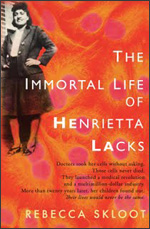| |
2010s |
| |
The Art of Fielding, Chad Harbach
Beautiful Ruins, Jess Walter
Dead Stars, Bruce Wagner
Dept. of Speculation, Jenny Offill
The Devil All the Time, Donald Ray Pollock
Freedom, Jonathan Franzen
The Goldfinch, Donna Tartt
Hallucinations, Oliver Sacks
The Immortal Life of Henrietta Lacks, Rebecca Skloot
The Imperfectionists, Tom Rachman
The Interestings, Meg Wolitzer
The Maid’s Version, Daniel Woodrell
Mortality, Christopher Hitchens
The Sense of an Ending, Julian Barnes
The Sixth Extinction: An Unnatural History, Elizabeth Kolbert
The Snow Queen, Michael Cunningham
A Visit from the Goon Squad, Jennifer Egan
We Are Not Ourselves, Matthew Thomas
We the Animals, Justin Torres
What You See in the Dark, Manuel Muñoz
The Woman Upstairs, Claire Messud |
|
|
The Immortal Life of Henrietta Lacks, Rebecca Skloot
Crown, February 2, 2010
Count me among those grateful, multiplying overnight like active colonies spreading across a laboratory Petri dish, who recognize the significance of the name Henrietta Lacks and why it is believed she still lives, decades after dying from cancer in 1951. Lacks’s distinction in history has been documented over the years, but ardent awareness of her unwitting humanitarian gift, which stalled in social consciousness for generations, gathers critical mass upon broadened investigation. Emblematic for an identity propagating with renewed fervor, a headstone even finally honors her long unmarked grave. Bourgeoning respect, however, is muddled by a persistent argument that nobody, besides family and friends, should know her name at all.
Regrettably, one judgment absent amidst the debate is that of Henrietta Lacks, herself. She never granted consent in the intimate decisions sealing her fate, despite implied confidentiality. Her origins were leaked posthumously; her privacy violated, representing a single injustice throughout a series of remarkable wrongdoings subjected upon the poor, sickened mother of five at the end of her existence and onto death. As a result, she personifies breakthrough experimentation on disparate fronts. The aftermath of her trials—clinical and ethical—is staggering.
Overwhelming volume alone warrants public absorption of Henrietta Lacks, and, in an effort to disseminate her renown, I purposefully repeat her name with the hope that it soaks in fully disclosed. Doing so, I face accusations of complicity in specific breaches that vex her treatment from the start. I defend my decision, though, with justification that the most sincere means by which Henrietta Lacks may live in immortality is for her sacrifice to inhabit the appreciation of her benefactors, a select group that includes everyone.
While new people familiarize themselves with the Henrietta Lacks legacy each day, more still are required to equal the sheer size of lives she affected. Ask a teacher: Who was Henrietta Lacks? Ask a friend. Ask yourself. If the response is, “I don’t know,” then make it a priority to investigate the answer. Scrupulous research and development already chronicles formidable results. To study Henrietta Lacks is to experience the wonder of discovery. At a bare minimum, her memory earns the dignity of the effort.
Suppressing Henrietta Lacks in name diminishes the human being at the center of extraordinary circumstance. The implications of ignoring her are far greater than exposure from tribute. Furthermore, as someone enriched by her tale is likely to concede, obscurity and her identity—down to her very DNA—do not coincide in common thought. Henrietta Lacks cultivates ubiquitously, endowing mankind with its own potential for everlasting life.
-MEG

|
|
 |

